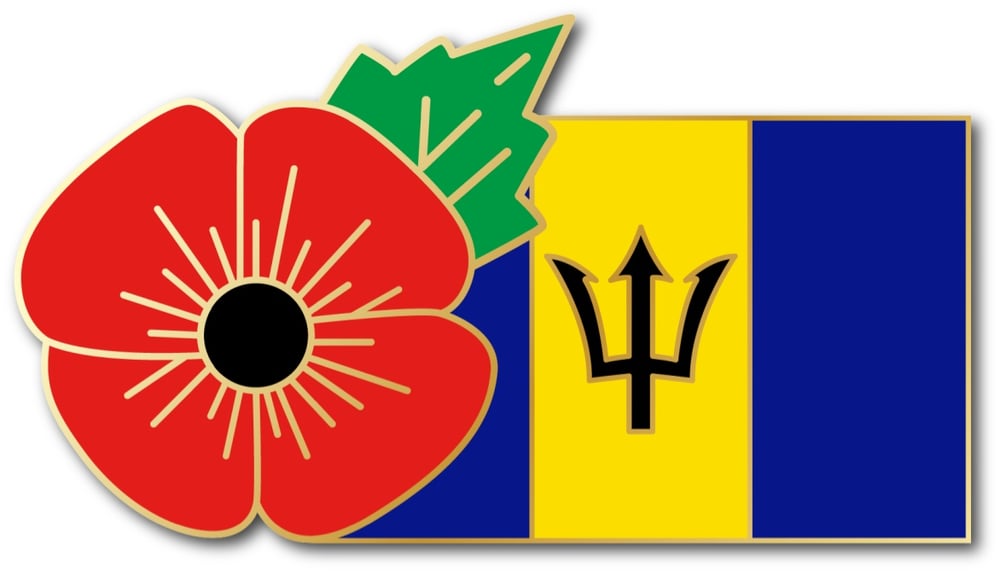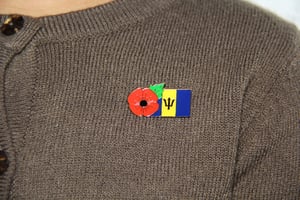BARBADOS FMN Poppy/Flag Combo Medal (28mm x 15.5mm)
£5.99 On sale

Barbados, along with many other Caribbean nations showed overwhelming support for Britain, the "Mother Country" (having been a British Colony since 1655) when war broke out in 1914.
In addition to the 831+ Ba(rba)dian military personnel;
'Gifts to the value of several thousand pounds were contributed by the colonies to the war effort; these included sugar, rum, oil, lime, cotton, rice, clothing, logwood, and nine aeroplanes. A total of 11 ambulances and adequate funds for their maintenance were donated, and approximately two million pounds sterling was given to the British government and charities. These donations were made in spite of severe hardships caused by major increases in the cost of living throughout the region which occurred with the proclamation of war.'
(see: http://www.bbc.co.uk/history/worldwars/wwone west_indies_01.shtml)
15,601 were recruited into British regiments from:
▪ Jamaica (contributing two-thirds of these volunteers)
▪ Barbados
▪ Trinidad and Tobago
▪ The Bahamas,
▪ British Honduras (now Belize)
▪ Grenada
▪ British Guiana (now Guyana)
▪ Leeward Islands
▪ Saint Lucia
▪ St. Vincent.
In October and November 1915 many of the contingents were brought together at Seaford, West Sussex, England and were formed into the British West Indies (Volunteer) Regiment (BWIR).
As a volunteer regiment consisting of troops from the British colonies of the West Indies, the BWIR served on the Western Front and in the Middle East during the First World War.
Two of its 12 battalions were involved in fighting against the Turks in Palestine and Jordan in 1918, as well as a full Regimental service in:
▪ East Africa
▪ Egypt
▪ Palestine
▪ Jordan
▪ France
▪ Italy
Although two battalions of the BWIR were involved in fighting in Palestine and Jordan against the Turkish army (where they sustained many casualties and honours) the War Office determined that Black colonial troops (Britains Allies) would not fight against Europeans (Britains enemies), consequently most members of BWIR functioned in non-combat positions, as labour battalions. Members of the BWIR also experienced discrimination in housing, promotion, treatment in demobilisation and even pay. This should serve to indicate the sentiment held towards these brave Caribbeans who had come to serve King and Country.
Consisting of 397 officers and 15,204 other ranks, the Regiment was awarded 81 medals in total, including 5 DSOs, 9 MCs, 2 MBEs, 8 DCMs, 37 MMs and received 49 Mentions in Dispatches for service During World War I. The Regiment was disbanded in 1921.
WW2
Memorial Gates Trust so learnedly inform us that:
▪16,000 West Indians volunteered for service alongside the British during World War 2
▪This consisted of over 100 women who were posted overseas - 80 choosing to serve with the WAAF (Women’s Auxiliary Air Force), while around 30 joined the ATS (Auxiliary Territorial Service).
▪Around 6,000 West Indians served with the Royal Air Force and the Royal Canadian Air Force, in roles from fighter pilots to bomb aimers, air gunners to ground staff and administration
▪Thousands of West Indian seamen made their contributions in one of the Second World War’s most dangerous services, the Merchant Navy - one-third of all merchant seamen were to die during the war.
▪One thousand volunteers for armed service were formed into the Caribbean Regiment, which went overseas in 1944 and saw service in the Middle East and Italy
▪In addition, West Indians served in the Royal Engineers as highly skilled technicians.
▪40,000+ West Indians opted to join the various branches of the civilian war effort in the United States.
▪236 Caribbean volunteers were killed or reported missing during the Second World War; 265 were wounded.
▪Caribbean air force personnel received 103 decorations.
(See: http://www.mgtrust.org/car2.htm)
Barbados gained Independence from Britain on 30th November 1966.
It boggles the mind how, since that time, the military exploits, the honours, decorations and the sacrifices of these Caribbeans could disappear from history. Join with us in our efforts to publicise, celebrate and pay homage to our West Indian (Caribbean) allies and friends who served sacrificially in military conflict to defend British values and the freedoms we civilians enjoy. Lest WE forget!


